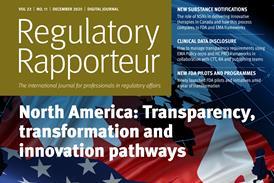‘Science is more than
a body of knowledge’
By  Alan Booth2023-01-04T11:16:00
Alan Booth2023-01-04T11:16:00

How the Regulatory Rapporteur’s online platform will provide its online journal experience
How to read this journal article
Thank you for visiting Regulatory Rapporteur. Journal articles are restricted to TOPRA members and registered users.
If you are a TOPRA member, or have already registered for limited free access, log in now (Option 1 below).
Not yet a member? You can either join TOPRA (Option 2 below) or register to view limited content for free (Option 3 below).
1. LOGIN
Already a TOPRA member?
Log in now using your MyTOPRA credentials, for unlimited access to all Regulatory Rapporteur journal articles, the online archive and latest industry news and podcasts.
Renew your TOPRA membership for 2026 here.
Already registered for free content?
If you are not a TOPRA member but have already created an account to access limited free content, log in here using your registered user email and password.
Login2. JOIN TOPRA
TOPRA membership
Become a TOPRA member and join our global regulatory affairs community.
- Great savings on our events and training.
- Be part of our dynamic international community.
- Contribute to the profession.
- Grow your skills and knowledge.
- Take your career to the next level.
3. REGISTER FOR FREE
Want free access to selected content?
Register now to continue to access industry news, editorials and podcasts plus one member-only journal article each month.
- Create your own library to save your favourite content.
- What is Regulatory Affairs?
- TOPRA Membership
- Regulatory Rapporteur Editorial Board
- Regulatory Rapporteur Editorial Area
- Future Focus Topics
- FAQs
- Glossary
- Privacy Policy
- ISSN 2755-5070 (online)
ISSN 1742-8955 (print - legacy)
Regulatory Rapporteur
The peer-reviewed journal, published 11 times per year and available free to TOPRA members.

The Organisation for Professionals in Regulatory Affairs
TOPRA office
TOPRA Publishing, Third floor, City Reach, 5 Greenwich View Place, London E14 9NN, UK
Tel: +44 (0) 20 7510 2560
Email: publications@topra.org
TOPRA AISBL
Blvd du Souverain 280, 1160 Brussels, Belgium
Tel: +32 (0) 2 808 72 70
- Contact us
- Copyright © 2015-2025 The Organisation for Professionals in Regulatory Affairs Ltd. t/a Regulatory Rapporteur - All rights reserved
Site powered by Webvision Cloud


















